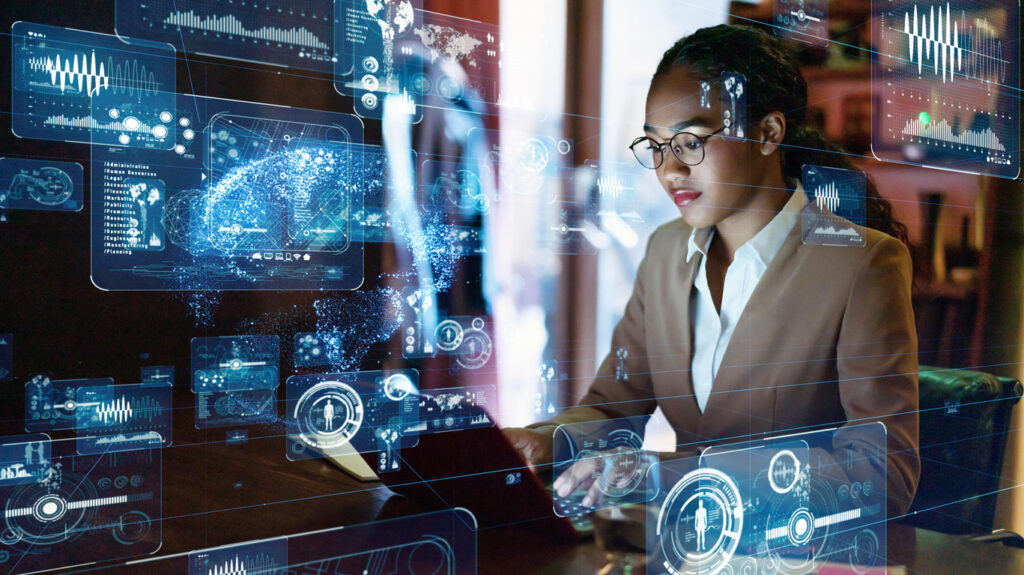Becky Norman, Editor, TrainingZone: Can you begin by telling us a bit about your L&D journey? How did your experience as a CLO at Microsoft inform your views today on the industry?
Most of my career I have been working at the intersection of learning technology and the workplace. This includes leading LMS-based marketing and customer training at Oracle, then leading content development and the customer training P&L at Microsoft.
But my most recent role at Microsoft as CLO for the global field sales organisation was the real catalyst for my current work, which was a journey to first build a learning culture at Microsoft allied with the recognition that we needed to be much more effective in helping employees prepare for the future of work in a time of disruptive change.
Becky Norman, Editor, TrainingZone: In your talk at Learning Technologies 2020 you argued the need for L&D to leverage data science, social science, computer science and neuroscience to help people become better learners. Can you tell us more about this?
I see progressive L&D departments as increasingly needing to shift to a more scientific mindset and toolset as a basis for operations. Obviously, we’ve been hiring computer scientists to help us use technology to assist our learners, but increasingly we are hiring or engaging with scientists to help us move the profession forward. Why?
1. Data science
With many learners and workers now wired together and collaborating on productivity suites such as Microsoft 365, CRM systems such as Salesforce and on learning platforms such as Degreed or EdCast, their activities leave a trail, a digital exhaust if you like, that can precisely target where learning interventions need to happen.
Gone are the days where creating spreadsheets of training activities to demonstrate ROI was L&D’s primary data-driven activity! Now, the higher order activity is the deep analysis of what the problems are and the business impacts of our work.
2. Social and behavioural science
Building organisational cultures that embody learning mindsets, learn from failure and create value from research and collaboration requires a deep understanding of how organisations truly operate.
(Hint: it’s not a reflection of your org chart!) Understanding social dynamics and how to influence and leverage them is part anthropology, part social psychology and part behavioural. These are all critical functions for next generation L&D.
3. Neuroscience
There is an amazing explosion of research and understanding of how the brain works, with cognitive science, neuroscience and related fields bringing a much deeper understanding of what brain friendly conditions are necessary for effective learning and performance. I’m getting more and more convinced that next generation L&D will need to employ these disciplines (directly or indirectly). But if they don’t we will still need to operate with a much more scientific mindset than we’ve used in the past. That means starting to formally identify and quantify the problem, form and test hypotheses, and openly share and challenge results.
Becky Norman, Editor, TrainingZone: During your recent session you also referenced Dani Johnson’s research on what makes us ‘human’. In our mission to improve learning, are we focusing too much on technological solutions and too little on harnessing our unique human capabilities?
Great question. Published last year, Dani’s meta-study (available at www.redthreadresearch.com) on what differentiates us from other species – and, of course, the robots and technology that are driving workplace change – has been very influential in shaping my thinking.
Of course, we need to teach the technical, process, and operational skills that underpin our business (e.g. flying a commercial plane, writing software, diagnosing illness etc.) But increasingly, the evidence is mounting to suggest that more human capabilities, such as collaboration, empathy, communication and leadership, ought to be the highest impact focus for us.
Becky Norman, Editor, TrainingZone: I see you’re working with ex Microsoft Africa and L&D influencer Lutz Ziob on a special podcast project called ‘Learning 4 Good’. What lessons can be learned from L&D experts in the non-profit sector?
We are learning so much in our conversations with learning practitioners who work in the international aid space and in Africa. To pick just one: resource constraints often lead to the most impactful design and solutions.
I’ve also been really struck with how folks use the capabilities and tools they have access to rather than seek out ‘shiny objects,’ as well as the value of a relentless focus on the problem you are trying to solve. Again, interestingly, that human element has always been a driver in this sector.
Becky Norman, Editor, TrainingZone: Finally, there’s a lot of talk among thought leaders on the need to transform the industry. Can you offer any practical guidance on where practitioners should be focusing their efforts?
Yes… stop what you are doing! Get clear on the problems you are trying to solve, look around you to learn from some progressive L&D practitioners and run lots of radical experiments. Our podcast series www.LearningIsTheNewWorking.org might be the best place to start, as there you’ll hear other people in the profession talk about how they’ve started to do the above.
Download the Learning Disruptor’s Handbook for a curated set of nudges, ideas, approaches, and resources to help you rethink your workplace learning strategy in the face of the massive disruption that’s definitely headed your way.
Becky Norman, Editor, TrainingZone: Can you begin by telling us a bit about your L&D journey? How did your experience as a CLO at Microsoft inform your views today on the industry?
Most of my career I have been working at the intersection of learning technology and the workplace. This includes leading LMS-based marketing and customer training at Oracle, then leading content development and the customer training P&L at Microsoft.
But my most recent role at Microsoft as CLO for the global field sales organisation was the real catalyst for my current work, which was a journey to first build a learning culture at Microsoft allied with the recognition that we needed to be much more effective in helping employees prepare for the future of work in a time of disruptive change.
Becky Norman, Editor, TrainingZone: In your talk at Learning Technologies 2020 you argued the need for L&D to leverage data science, social science, computer science and neuroscience to help people become better learners. Can you tell us more about this?
I see progressive L&D departments as increasingly needing to shift to a more scientific mindset and toolset as a basis for operations. Obviously, we’ve been hiring computer scientists to help us use technology to assist our learners, but increasingly we are hiring or engaging with scientists to help us move the profession forward. Why?
1. Data science
With many learners and workers now wired together and collaborating on productivity suites such as Microsoft 365, CRM systems such as Salesforce and on learning platforms such as Degreed or EdCast, their activities leave a trail, a digital exhaust if you like, that can precisely target where learning interventions need to happen.
Gone are the days where creating spreadsheets of training activities to demonstrate ROI was L&D’s primary data-driven activity! Now, the higher order activity is the deep analysis of what the problems are and the business impacts of our work.
2. Social and behavioural science
Building organisational cultures that embody learning mindsets, learn from failure and create value from research and collaboration requires a deep understanding of how organisations truly operate.
(Hint: it’s not a reflection of your org chart!) Understanding social dynamics and how to influence and leverage them is part anthropology, part social psychology and part behavioural. These are all critical functions for next generation L&D.
3. Neuroscience
There is an amazing explosion of research and understanding of how the brain works, with cognitive science, neuroscience and related fields bringing a much deeper understanding of what brain friendly conditions are necessary for effective learning and performance. I’m getting more and more convinced that next generation L&D will need to employ these disciplines (directly or indirectly). But if they don’t we will still need to operate with a much more scientific mindset than we’ve used in the past. That means starting to formally identify and quantify the problem, form and test hypotheses, and openly share and challenge results.
Becky Norman, Editor, TrainingZone: During your recent session you also referenced Dani Johnson’s research on what makes us ‘human’. In our mission to improve learning, are we focusing too much on technological solutions and too little on harnessing our unique human capabilities?
Great question. Published last year, Dani’s meta-study (available at www.redthreadresearch.com) on what differentiates us from other species – and, of course, the robots and technology that are driving workplace change – has been very influential in shaping my thinking.
Of course, we need to teach the technical, process, and operational skills that underpin our business (e.g. flying a commercial plane, writing software, diagnosing illness etc.) But increasingly, the evidence is mounting to suggest that more human capabilities, such as collaboration, empathy, communication and leadership, ought to be the highest impact focus for us.
Becky Norman, Editor, TrainingZone: I see you’re working with ex Microsoft Africa and L&D influencer Lutz Ziob on a special podcast project called ‘Learning 4 Good’. What lessons can be learned from L&D experts in the non-profit sector?
We are learning so much in our conversations with learning practitioners who work in the international aid space and in Africa. To pick just one: resource constraints often lead to the most impactful design and solutions.
I’ve also been really struck with how folks use the capabilities and tools they have access to rather than seek out ‘shiny objects,’ as well as the value of a relentless focus on the problem you are trying to solve. Again, interestingly, that human element has always been a driver in this sector.
Becky Norman, Editor, TrainingZone: Finally, there’s a lot of talk among thought leaders on the need to transform the industry. Can you offer any practical guidance on where practitioners should be focusing their efforts?
Yes… stop what you are doing! Get clear on the problems you are trying to solve, look around you to learn from some progressive L&D practitioners and run lots of radical experiments. Our podcast series www.LearningIsTheNewWorking.org might be the best place to start, as there you’ll hear other people in the profession talk about how they’ve started to do the above.
Download the Learning Disruptor’s Handbook for a curated set of nudges, ideas, approaches, and resources to help you rethink your workplace learning strategy in the face of the massive disruption that’s definitely headed your way.





